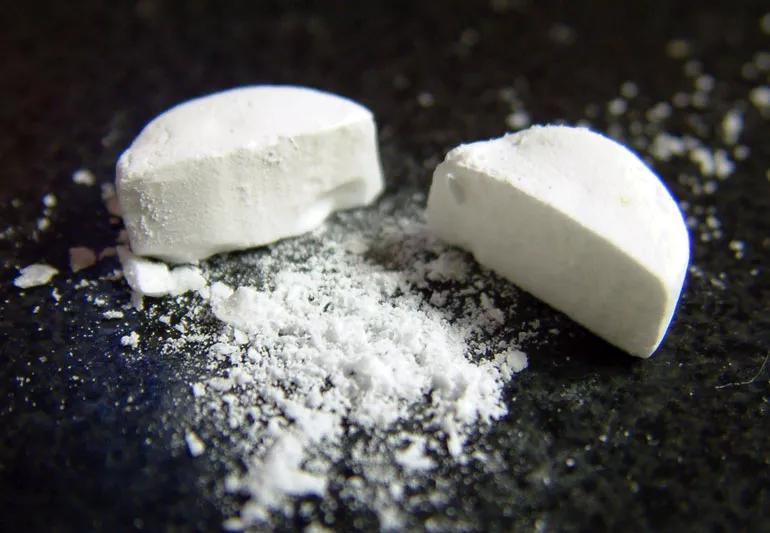Cutting pills is a normal — and potentially dangerous — practice

It’s not ideal to split a pill. But can it be done? Absolutely, in some cases — but it’s a process that can come with definite risks, primarily related to getting a correct dosage.
Advertisement
Cleveland Clinic is a non-profit academic medical center. Advertising on our site helps support our mission. We do not endorse non-Cleveland Clinic products or services. Policy
But the reality is that the slicing and dicing of medications happens … and it happens a lot. One study estimated that almost 25% of pills are split. The reasons why vary from the economic (saving cash) to the physical (difficulty swallowing a whole tablet).
So, if you’re going to do it, follow this advice: Ask before you make a cut and take safety steps to do it properly, advises pharmacist Alison Miller, PharmD.
“Splitting a pill can be dangerous,” says Dr. Miller. “That’s where the discussion needs to start.”
Tablets with a score line typically mean they can be split. This mark, or notch, offers assistance to make a clean cut — usually to make two even halves. “A score is the No. 1 thing to look for,” notes Dr. Miller.
Guidance can also be found within the gobs of text on medication labels or patient package inserts. The “How Supplied” section notes whether a pill has been approved for splitting by the U.S. Food and Drug Administration (FDA).
But don’t just assume it’s safe to split any pill with a score mark.
“It’s always best to talk with your pharmacist or doctor first,” cautions Dr. Miller. “A score line might indicate a pill can be split, but it doesn’t mean that you should.”
If there’s no score line on a pill, consider it a STRONG message that it’s not meant to be split. Medications that fall in this category include:
Advertisement
The right equipment is essential for splitting a pill. For more accurate splitting, look for a specialized pill cutter at a pharmacy or online market.
The most common design features a V-shaped pill holder and a retractable blade that presses down on the tablet. Make sure to do the downward cutting motion quickly. A slow press can make the pill crumble.
These nifty pill cutting devices — which often can be purchased for just a few bucks — are a much better option than, ahem, other more creative methods.
“I’ve had people tell me they’ve bitten pills in half or used their fingernails,” says Dr. Miller. “I’ve heard from people about using butter knives, too, which usually sends pill pieces flying all over the kitchen.”
Other splitting tips include:
How difficult can it be to evenly split a pill in half? Well, it’s tougher than you might think. One study found that almost 1 in 8 split pills were off by more than 20%. That’s not exactly top precision.
Dosage errors can be dangerous in either direction, notes Dr. Miller. Taking too much of a medication can lead to a potential overdose. Getting too little, meanwhile, can limit the intended benefits.
“Whenever you split a pill, you probably aren’t getting the exact dosage your prescription calls for,” says Dr. Miller. “That can have consequences.”
Advertisement
While splitting pills may not be encouraged, there are definite and understandable reasons why it’s done. The most common explanations include:
“There are times when you might need to split a pill,” says Dr. Miller. “But it’s always best to talk to your doctor or pharmacist first. There may be ways to get the proper dosage into one pill that works, which is preferred.”
Advertisement
Learn more about our editorial process.
Advertisement

The little blue pill might help with physical arousal, but there are better treatments for low libido in women

Your body’s response to rapid weight loss from the medication may cause shedding

This medication is best used on a limited basis

Authorized take-back programs, services and drop-off locations are the best, safest way to get rid of expired medicine

These illegal supplements have negative impacts for vital organs and may cause psychosis, heart attacks and more

These creams that you apply to your skin can actually help reduce localized pain, swelling and inflammation

Popular among teens, these inhalants give you a quick high, with serious harmful effects

‘Black box warnings’ on medications outline potential risks and important instructions

The tropical fruit is a good source of antioxidants and vitamin C

Most people fall asleep within 10 to 20 minutes, but if your experience is different, adjusting your sleep schedule may help

Exploring your hidden side can lead to better understanding of what makes you tick